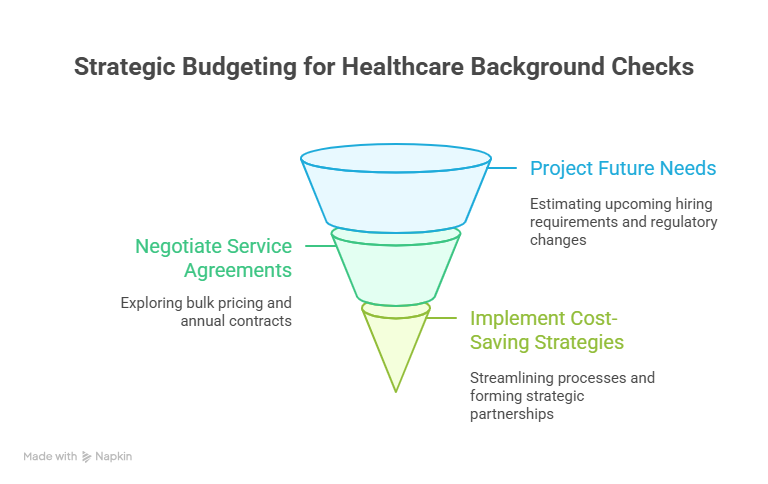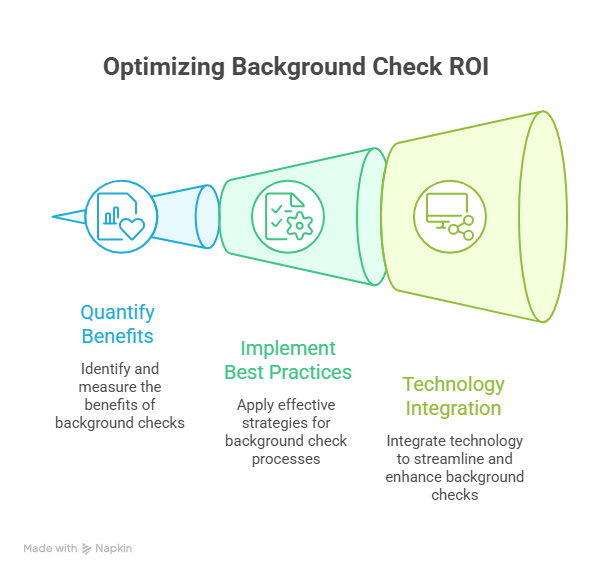In the healthcare sector, ensuring the safety and trustworthiness of your workforce is paramount. Whether it’s a bustling hospital, a private clinic, or a long-term care facility, conducting thorough background checks is non-negotiable. But how do healthcare institutions balance this critical requirement against budget constraints? Welcome to the intricate world of healthcare background check costs.
Healthcare institutions face a critical balancing act: ensuring patient safety through comprehensive employee screening while managing tight operational budgets. For hospital HR departments and healthcare administrators, understanding the true cost of background checks is essential for effective financial planning and regulatory compliance.
This comprehensive guide breaks down healthcare background check costs, explores budgeting strategies, and provides actionable insights to help you optimize your screening investments without compromising safety standards.
Key Takeaways
- Healthcare background checks typically range from $30-$150 per hire, depending on screening depth
- Conducting thorough background checks is non-negotiable for ensuring the integrity and safety of various industries, particularly healthcare
- Strategic budgeting and bulk pricing negotiations can significantly reduce per-check costs
- Non-compliance penalties often exceed screening costs by substantial margins
- Geographic location and role complexity significantly impact pricing structures
Why Healthcare Background Checks Are Non-Negotiable
In healthcare settings, background screening goes far beyond routine hiring practices—it's a fundamental patient safety requirement. Every healthcare worker, from physicians to administrative staff, has access to sensitive patient information and vulnerable populations.
The stakes couldn't be higher. Healthcare employers must ensure their workforce meets stringent standards to maintain patient trust and safety. Conducting thorough background checks is non-negotiable for ensuring the integrity and safety of various industries, particularly those involving sensitive information and public safety like healthcare.
EXPERT INSIGHT: I’ve learned that screening goes beyond compliance; it's a critical protection. When we’re bringing staff into a hospital or a classroom, those decisions carry real consequences. In a world with scarce resources and expanding expectations, it's so easy to see screening as a cost—but, in recent years, we’ve seen with our own eyes that it's better considered an investment to maintain trust, safety, and long-term resilience. If we go into screening with empathy as well as insight, then, yes, we fill jobs, but we help build better, safer societies. - Charm Paz, CHRP
Regulatory Requirements Drive Screening Necessity
Healthcare institutions must navigate complex federal and state regulations. The Department of Labor has strict rules about who can work in healthcare settings, including regulations under the Fair Labor Standards Act (FLSA) and Occupational Safety and Health Act (OSHA), which protect healthcare workers and ensure workplace safety.
The consequences of non-compliance extend far beyond simple fines. According to regulatory compliance experts, failing to comply can lead to:
- Hefty fines and legal issues
- Operational disruptions and forced shutdowns
- License suspension preventing legal operation
- Security breaches exposing sensitive patient data
- Lasting reputational damage leading to lost stakeholder trust
These severe consequences make comprehensive background screening a wise investment rather than an optional expense.
Understanding Healthcare Background Check Cost Factors
Healthcare background check pricing varies significantly based on several key factors that administrators must consider when budgeting.
Screening Depth and Complexity
A basic criminal check costs less than a detailed examination of work history, education, and professional licenses, as background check services categorize these costs differently based on complexity and scope. Here's what drives pricing differences:
Basic Screening Components:
- Criminal history check: $20-$75 per applicant
- Employment verification: $10-$50 per employer
- Education verification: $7-$15 per institution
- Professional license verification: $5-$30
Enhanced Screening Elements:
- Drug testing and fingerprinting
- International background checks
- Reference verification
- Credit history (for financial roles)
Geographic Impact on Pricing
Location significantly affects background check costs. Urban healthcare facilities typically pay premium rates due to:
- Broader search radius requirements
- Complex legal jurisdictions
- Higher service provider fees
- More comprehensive database access needs
Rural facilities may see lower base costs but could miss crucial information from neighboring jurisdictions without proper geographic coverage.
Role-Specific Requirements
Position complexity directly correlates with screening thoroughness:
High-Level Positions (Physicians, Department Heads):
- International screening requirements
- Extended employment history verification
- Multiple professional license checks
- Comprehensive reference verification
Direct Patient Care Roles (Nurses, Technicians):
- Criminal background checks
- Professional license verification
- Drug testing
- Education verification
Administrative Positions:
- Basic criminal history
- Employment verification
- Education confirmation
2025 Healthcare Background Check Pricing Trends
Market trends show healthcare background check costs steadily increasing, driven by enhanced regulatory requirements and growing demand for comprehensive screening.
Current Market Pricing
Healthcare organizations can expect to invest $50-$150 per hire for comprehensive background screening in 2025. This represents an increase from previous years due to:
- Enhanced regulatory compliance requirements
- More sophisticated screening technologies
- Expanded database access
- International screening capabilities
Cost Variation by Organization Size
Large Metropolitan Hospitals:
- Higher volume enables bulk pricing negotiations
- Access to comprehensive screening packages
- Typically pay $75-$125 per comprehensive check
Small Private Practices:
- Limited negotiating power
- Higher per-check costs
- Often pay $100-$150 for equivalent screening depth
Rural Healthcare Facilities:
- Variable pricing based on service provider availability
- May sacrifice screening comprehensiveness for cost savings
- Typical range: $50-$100 per check
Strategic Budgeting for Healthcare Background Checks
Effective background check budgeting requires a data-driven approach that balances thoroughness with fiscal responsibility.
Building Your Screening Budget
Step 1: Analyze Historical Data
- Review previous year's hiring volume
- Calculate average screening costs per hire
- Identify seasonal hiring patterns
- Account for turnover rates
Step 2: Project Future Needs
- Estimate upcoming hiring requirements
- Consider departmental expansion plans
- Factor in regulatory changes
- Plan for unexpected hiring surges
Step 3: Negotiate Service Agreements
- Explore bulk pricing options
- Consider annual contracts for rate stability
- Evaluate package deals combining multiple screening types
- Research multiple providers for competitive pricing
Cost-Saving Strategies
Volume Negotiations:
Most screening providers offer tiered pricing based on annual volume commitments. Organizations conducting 100+ checks annually can often secure 15-25% discounts.
Streamlined Processes:
- Implement electronic consent and disclosure systems
- Use integrated HRIS platforms for seamless data flow
- Automate routine verification processes
- Establish clear screening protocols by role type
Strategic Vendor Partnerships:
Long-term relationships with screening providers often yield:
- Preferential pricing structures
- Priority processing for urgent hires
- Enhanced reporting capabilities
- Dedicated account management

Compliance Costs vs. Non-Compliance Penalties
Understanding the financial implications of compliance versus non-compliance helps justify screening investments.
Regulatory Framework Requirements
Healthcare institutions must navigate multiple regulatory requirements:
Federal Requirements:
- HIPAA privacy and security standards
- Joint Commission accreditation standards
- CMS Conditions of Participation
- Office of Inspector General (OIG) exclusion screening
State-Level Mandates:
- Healthcare worker registry checks
- Abuse and neglect database screening
- Professional licensing verification
- Additional criminal history requirements
The True Cost of Non-Compliance
Recent regulatory enforcement data reveals staggering penalties for non-compliance:
- HIPAA violations: Fines ranging from $127-$1.9 million per incident
- Joint Commission sanctions: Potential accreditation loss affecting reimbursements
- State licensing penalties: Facility closure and operational restrictions
- Legal liability: Negligent hiring lawsuits averaging $1.2 million in settlements
These penalties far exceed the cost of comprehensive background screening programs, making compliance investments financially prudent.
Maximizing ROI on Background Check Investments
Smart healthcare administrators view background checks as risk mitigation investments rather than operational expenses.
Quantifying the Benefits
Patient Safety Value:
- Reduced medical malpractice incidents
- Lower patient complaint rates
- Enhanced institutional reputation
- Improved patient satisfaction scores
Operational Benefits:
- Decreased employee turnover costs
- Reduced theft and fraud incidents
- Enhanced workplace safety
- Improved staff reliability
Financial Protection:
- Avoided regulatory penalties
- Reduced legal liability exposure
- Protected reimbursement streams
- Maintained accreditation status
Implementation Best Practices
Develop Clear Screening Protocols:
- Establish role-specific screening requirements
- Create standardized timelines for completion
- Implement consistent adverse action procedures
- Maintain comprehensive documentation
Technology Integration:
- Create dashboard reporting for oversight
- Use background check platforms with HRIS integration
- Implement electronic consent management
- Establish automated compliance tracking

Conclusion: Investing in Safety and Compliance
Healthcare background check costs represent essential investments in patient safety, regulatory compliance, and institutional integrity. While budget constraints are real, the financial and reputational risks of inadequate screening far exceed the costs of comprehensive programs.
By understanding cost factors, implementing strategic budgeting practices, and leveraging technology solutions, healthcare organizations can optimize their screening investments while maintaining the highest safety standards.
Ready to optimize your healthcare background screening program? Contact screening professionals to explore customized solutions that balance thoroughness with budget efficiency. Remember: in healthcare, comprehensive screening isn't just good business—it's a moral imperative that protects the patients who trust you with their lives.
Frequently Asked Questions (FAQs)
How much does a healthcare background check cost in 2025?
By 2025, healthcare background checks may range from $50 to $150 per check, depending on the depth of the screening. More comprehensive checks with additional verifications, like international searches, could cost more.
What is included in a hospital background screening?
A typical hospital background screening includes criminal history, employment verification, education verification, and often license and certification checks. Some hospitals also include drug testing and reference checks.
Do hospitals pay for drug tests and license checks?
Generally, hospitals cover the costs for drug tests and license verifications during the hiring process. This ensures compliance and maintains a high standard of care.
Can background check costs be passed to contractors?
Yes, hospitals can pass these costs along to contractors. This is common practice, especially if contractors are required to meet the same standards as full-time staff.
How can hospitals lower background screening expenses?
Hospitals can negotiate bulk screening deals with agencies or use streamlined services for quicker results. Regularly updating and reviewing the screening processes can also eliminate redundant checks.
What are the consequences of not conducting thorough background checks?
Not conducting thorough checks can lead to hiring individuals with disqualifying histories, which can increase liability and harm patient trust and safety.
Are there specific regulations hospitals must follow for background checks?
Yes, hospitals must comply with federal and state laws regarding background checks. These laws ensure that screenings are conducted fairly and without discrimination.
How long does a typical healthcare background check take?
A standard check takes between two to five business days, depending on the complexity and the jurisdictions involved.
Can an applicant start working before all background checks are completed?
This depends on hospital policy and the role's requirements. Some hospitals allow temporary work assignments until full clearance is received.
How often should hospitals re-screen current employees?
Re-screening frequency varies by institution but a common practice is to conduct annual checks or when an employee assumes a new role that includes increased responsibilities.
Definitions
Within the world of healthcare background screening, definition represents a guiding principle above all. Comprehending its terms and processes proves critical, so your compliance efforts are not only comprehensive but relevant and informed. The below definitions seek to effectively steer policies, conversation, and resolutions.
Background Checks
A background check is the process of reviewing a job candidate’s history to confirm information and identify potential risks. In healthcare, this often includes criminal records, employment history, education, and license verification. The goal is to protect patients and comply with legal requirements. Are you checking all the right areas based on your roles?
Compliance
Compliance means following laws, regulations, and internal policies that apply to your organization. In healthcare, this includes federal rules like HIPAA and state guidelines around hiring. Staying compliant helps you avoid penalties and keep your institution’s reputation intact. When was the last time you reviewed your screening process for legal accuracy?
Employment Verification
Employment verification confirms that a candidate worked where they said they did. It involves contacting past employers to check dates, job titles, and possibly reasons for leaving. This helps you catch inconsistencies and measure reliability. How confident are you in the accuracy of your current hires’ work history?
Professional License Verification
This process checks whether a candidate holds a valid license to perform their healthcare role. It confirms the license's status, renewal history, and any disciplinary actions. It's critical for roles like nurses, doctors, or technicians. Are you regularly checking the license status of existing staff?
Budgeting
Budgeting is the act of planning and allocating financial resources to cover expected expenses. When applied to background checks, it means estimating costs based on hiring volume, screening depth, and external service fees. A solid budget helps you manage hiring needs without overspending. What does your current budget say about your hiring priorities?
References
- 40+ Background Check Statistics in 2025
- Understanding Background Check Costs (2025)
- 3 Ways to Justify Your Background Check Budget for 2025
- New Strategies for Employers as Healthcare Costs Set to Surge in 2025
Legal Disclaimer: This guide provides general information and should not be construed as legal advice. Employment law is complex and fact-specific. Consult with qualified employment counsel for guidance on your specific situation and compliance requirements. GCheck provides background screening services and compliance consulting but does not provide legal advice.
This article is current as of publication date. Laws and regulations may change. Check with qualified legal counsel and regulatory agencies for the most current requirements and interpretations.

GCheck Editorial Team
Meet the GCheck Editorial Team, your trusted source for insightful and up-to-date information in the world of employment background checks. Committed to delivering the latest trends, best practices, and industry insights, our team is dedicated to keeping you informed.
With a passion for ensuring accuracy, compliance, and efficiency in background screening, we are your go-to experts in the field. Stay tuned for our comprehensive articles, guides, and analysis, designed to empower businesses and individuals with the knowledge they need to make informed decisions.
At GCheck, we're here to guide you through the complexities of background checks, every step of the way.






